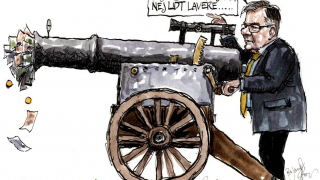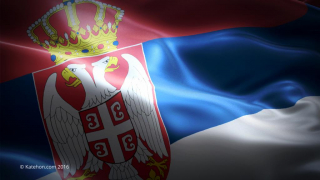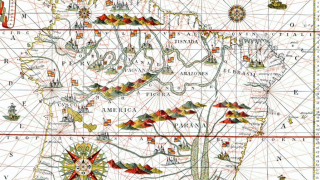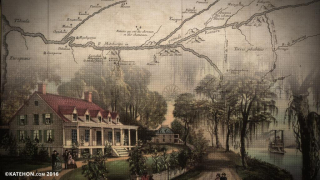Toward a logic of Atlanticism from Palmerston to the present
To understand the logic of Atlanticism, including modern Atlanticism, it is sufficient to consider an illustrative example: the events of the 1830s. From 1830 to 1841 the levers of world Atlanticism were actually in the hands of Palmerston, who had the nickname Palm (PAM) - the Pan-Atlantic Wizard. Being formally only a foreign minister under the false prime ministers Gray and Melbourne (an Australian man and city), Palmerston actually determined the entire British geopolitics during these 11 years (excluding a very brief hiatus in 1834-35, when King William IV appointed for the last time in history a prime minister, namely Wellington, against the will of Parliament, but Palmerston again did his own thing and put the king under his belt).
Palmerston is a direct precursor of NATO, and the system he created was ahead of its time, having to cope with the immaturity of the then international situation, its unpreparedness to fully implement the Atlanticist program. For this reason, it was not fully implemented during Palmerston's lifetime (he absolutely dominated the British political scene from 1827 until his death in 1865).
To understand the logic in which the Atlanticists still operate today, it is best to look at Palmerston's geopolitics, because it was much more pronounced than that of his not always consistent and faded successors. Today everyone discusses the Guyana-Esekibo problem, which Venezuela has gaped at from Palmerston to the present for 192 years. But at that time, it was not a single event, but a well-thought-out strategy, a chain of similar events.
The logic of the actions of Palmerston and his direct predecessors and successors was simple and uncomplicated, even crude, and could be understood by a schoolboy. Surprisingly, only a few leaders of the other states understood it and dared to oppose it, while the majority were taken by surprise.
The action of the Pan-Atlantic Wizard and Co. was threefold:
- wrest all the major continental states, which were very small in terms of territory but had incredibly favorable ports, from their surrounding areas and turn them into outposts of British naval power as puppet states (and only if they were very lucky - fragment the continental states themselves into pieces);
- support an alliance of liberals and leftists to organize revolutionary activities and conduct civil wars against the conservatives (in other words, export the revolution);
- all accompanied by absolutely bestial treatment of its own people and a constant deterioration of their standard of living. Paradoxically, Atlanticism always works to benefit a small circle of elites and never the masses of their own countries, who derive no real benefit from colonial exploitation of the rest of the world.
Let us now see where the above two techniques have brought the Pam era Atlanticists resounding success and where they have failed, and why. The connection to our own time is direct: the geopolitical tactics of the Atlanticists have not changed significantly.
Time and again, in the late 1820s and early 1840s, the Atlanticists pulled off the same geopolitical trick called “take away a piece of coastline and make it an outpost of the sea”. This is how the following events came about:
- the British, who, during the Argentine-Brazilian wars, wrested a piece of disputed territory and turned it into the puppet state of Uruguay (1828), which later (in its coastal area) fell to Atlanticist France;
- the British wrested from the Netherlands the new puppet kingdom of Belgium (1830) as a counterweight to France, the Netherlands and Prussia;
- the seizure from the Ottoman Empire of an impractical piece of southern Greece, dependent on sea forces; the subsequent assassination of the pro-Russian President Kapodistria (1831); and the transformation of Greece into a puppet of London with the simultaneous push of the Turks;
- the dismemberment into pieces of Greater Colombia with the death of Bolivar (1830-31), including the subtraction of the Essequibo River region from British Guiana (Guyana);
- the subtraction of the Malvinas Islands from Argentina (1833);
- dismemberment of the United Provinces of Central America, after the overthrow of the British protégé, into five dwarf and weak states (1838-40), with the simultaneous elevation of British Honduras (Belize);
- British acquisition of sphere of influence in coastal areas during civil wars in Spain, Portugal and Uruguay;
- British landings at the Circassians on the Caucasus coast during the war against Russia;
- the Opium War and the seizure of Hong Kong from China (1839-40).
Of course, the crowning glory of the continent's plundering strategy a little later would be Palmerston's favorite son: the Crimean War against Russia, which, however, failed to achieve its maximum objectives because of Russian successes in defense and the cooling off of the European allies against Palmerston's Britain.
In all this, the clear strategy of Palmerston and his immediate predecessors and successors, the Atlanticists, was evident. Their continental opponents usually proved either sympathetic but frankly weak in military or political terms, or strong but clueless in countering the geopolitical blows of the Atlanticist strategists. If we take the 1830s, there were only two rulers on the planet smart and strong enough for the pan-Atlantic wizard to break his teeth on them: the Afghan Emir Dost-Mohammed and the Paraguayan supreme ruler Dr. Francia. All the others ended up in the hands of the Atlanticists in the most pathetic way.
The Atlanticist strategy devised by Palmerston and Co. has remained essentially unchanged to this day. If its first pillar is the zeroing in on coastal territories, its second is British support for subversive and terrorist movements in other countries: in the 1830s, most often leftist and liberal, but Caucasian highlanders (Urquhart's mission) and the Polish and Hungarian gentry were also involved. Palmerston took an important step in turning London into a global revolutionary headquarters by brutally suppressing all protest and social opposition within Britain itself.
Therefore, when in 1848-1853 Fyodor Tyutchev and Friedrich Engels stood in solidarity against Russia and the Revolution (the former on the side of Russia, the latter on the side of the Revolution), it must be kept in mind that it was from the 1830s onward that a strong alliance was being formed between the British (and the increasingly dependent French) elite and the global Revolution. So, Marx and Engels, Herzen and Bakunin were London's salesmen from the beginning.
The word Revolution is too polysemous and is used by all kinds of forces in opposite senses. But especially for communists, it should be explained that the liberal-plutocratic West tends to attribute to itself the monopoly of the Revolution, which is interpreted as a common struggle of the bourgeoisie and the left against traditional institutions and values for the complete emancipation of the individual from everything (it began with God and the monarch, continued with property and churches, and ended with gender). In recent years, the ideologues of Atlanticism have begun to call these processes the “Atlantic Revolution”, contrasting it with the conservative-Continental Revolutions, if not by design, by results. In this regard, once again, the example of dozens of instances in which important figures began in their youth with left-wing revolutionarism, but, giving it an anti-bourgeois character from the start, soon landed on conservative, sacred, traditional positions, is illustrative. Please, this was the secret of Dr. Francia and his Paraguayan revolution, against which all the combined naval power of Britain and France could do nothing in the Palmerston era.
Our communists are often too attached to the dogma of supposed revolution, whereas the capitalist West would have become conservative long ago. But it hasn't. From the point of view of the Atlanticist-globalists, modern NATO and EU imperialism is precisely a revolution against traditional forces and regimes; moreover, for them it is a continuation of the old bourgeois revolutions and the Marx-Engelsian “proletarian” revolution, among others. On the contrary, they saw the defunct USSR or Arab National Socialist regimes as “reactionary despotism”, just according to Marx and Engels.
That is why the leftists of yesterday constantly become the major ideologues of the West: it was so under Swinburne, it was so under Adorno and Horkheimer, it is so now under Glucksmann and Cohn-Bendit, Bernard-Henri Lévy and Žižek. Trotskyists in Leo Strauss's entourage became American neocons and educated Bush. The leftists of the 1960s and 1970s John Kerry, Joschka Fischer, Jens Stoltenberg became pillars of American capitalism and imperialism, of course not by accident. It is not just a matter of venality, but of the fact that the original idea of the left that “the individual must be emancipated” and “capitalism must be upheld against traditional societies because it is more emancipatory” simply could not lead to anything else if followed to the letter.
In the 1830s, the Atlanticists of Palmerston and Co. perfected techniques for encouraging revolutions that, in many ways, became the model for the color revolutions of the early 21st century-the school is the same. Let us see who and how supported British liberals.
For the Western European countries, it was a network of Masonic and paramasonic (Carbonarist) structures such as the “Young Italy” and others, along the lines of which new clones would later appear again and again in Eastern Europe in the second half of the 19th century (and Mikhail Katkov in the 1860s would have feared that the British would take over the organization of the “Young Yakuzie” and “Young Mordovie”).
The fate of the Italian Red Army, which received funding from the British Whigs and support from the British leftist intelligentsia, was unenviable: it was used and then abandoned. Neither Garibaldi nor Mazzini achieved real power. But both managed to work as mercenary troops of Atlanticism in Uruguay and for the Polish nobility, and at the end of their lives in the Franco-Prussian War.
The Uruguayan epic was particularly shameful. There was a civil war between the continentalist blancos (whites) led by the traditionalist former president Oribe and the Atlanticist colorados (reds), who locked themselves in the port of Montevideo and, with the support of the French navy, besieged the city for eight years (the longest siege of a city in modern times in the world). To keep Montevideo's maritime beachhead in the hands of the Anglo-French capitalists and to strangle the continentals of Oribe and Rosas, the European revolutionaries were brought to their knees by their liberal masters.
Palmerston's classic move was to support the Spanish and Portuguese liberals in their civil wars against the conservatives: the Carlists and the Miglists, respectively. Incidentally, it was the Carlists who were the first to call themselves “traditionalists”. Palmerston's plan resulted in the signing of the Fourth Alliance of Subversive Forces: the governments of Britain, France and the liberal juntas of Spain and Portugal. It is true that this alliance collapsed after ten years because of contradictions, but that is another story. Most importantly, a precedent was set for the consolidation of the forces of the Liberal Revolution into a single military bloc, the prototype of NATO.
However, Palmerston did not consider the internationalization of the conflict. It turned out that the game could be played in two. And while the liberal Freemasons supplied arms and contingents to the Spanish and Portuguese liberals, conservatives from all over Europe (including England itself) went to fight as volunteers for the Carlists and Miglists. French Royalists in the Vendée enlisted, Prussian Royalists led by Prince Lichnowsky enlisted to help the Carlists (who would later be killed in the 1848 revolution by a mob of Communists, again British puppets). These efforts were not in vain: although the Carlists did not win, but Isabella's liberal regime did, they soon saw an internal coup d'état by General Prim, which brought the anti-British conservatives (the ideologue Donoso Cortes) to power, with whom Palmerston broke diplomatic relations in 1848.
Above all, however, English traditionalists and Scotland itself also went to the aid of the Carlists. Moreover, if the “Young...” in Europe was a tool of London and Paris against traditional forces, “Young England” (and later “Young Ireland”), on the contrary, became a rallying point of British traditionalists against the liberal Atlanticist regime in London. The reasons for this must be mentioned separately, for herein lies the third most important feature of Atlanticism.
The third sign of Atlanticism (after the zeroing in on island and coastal territories and the artificial feeding of revolutions) may seem unusual and extremely illogical, irrational, even ridiculous. But without it Atlanticism would not be such.
It lies in the fact that, while profiting enormously from the exploitation of the rest of the conquered world, Atlanticist regimes are not at all inclined to spend the spoils on the development of their own countries. They continue to keep the people of their countries in horrible social conditions, fail to develop the available social benefits, ruin the infrastructure, etc. The Atlanticist elites spend all the loot on themselves, not on the population under their control, from which they recruit only a few individuals.
In other words, it is not accidental but natural that in their countries (Britain, the U.S., France, Australia, Japan, etc.) the solid Atlanticist regimes have kept most of the population in absolutely bestial conditions for decades and even centuries. Approximately zero level of housing and public services, filth and drug addiction in the center of mega-cities, absence of health care as a manageable national system (leading to its shameful collapse in 2020), chaos in education, deliberately destroyed rail and public transport infrastructure (with the special purpose of harming the citizens of their own country)... All of this is not a 21st century innovation at all. This is the way Atlanticism was in the “classic” 19th century: in the metropolises, and even in relation to its settlers in the island and overseas colonies (the way the British government treated the settlers of the strategically key islands of Ascension and St. Helena is a separate piece, and there were all kinds of Pacific stories as well). More recently, Trump rightly observed that “the United States is a Third World country at heart” (although he modestly neglected to add that he himself has done nothing to remedy this situation).
The behavior of Atlanticist governments, which pursue openly cannibalistic and anti-social policies not only toward foreign countries and peoples but also toward their own, again underscores the parasitic nature of these elites. The peoples of their countries (including those of Anglo-Saxon, French ethnicity, etc.) are not “theirs” to them, but only expendable material, if not a bit more expensive than the peoples of the “Third World”. Atlanticism is extremely elitist and classist, bringing fabulous profits only to the “traveling” layer of globalist cosmopolitans. The very inhabitants of the Atlanticist countries-both rural areas and urban slums-have suffered for centuries from these parasites no less than we have and are regarded by the Atlanticists not only as subjects but also as dangerous internal enemies who should receive nothing good: no roads, no public services, no wages, no health care, no education.
When we talk about the brilliance and demonstrativeness of the 1930s and, to a slightly lesser extent, the 1840s for the discovery of the three main signs of Atlanticism, then, after affirming the social-Darwinist, anti-personal and anti-human orientation of the socio-economic policies of the Atlanticist regimes of the time (Britain, first and foremost, but also France and the United States), the space opens up to talk about the traditionalist opposition to this evil, which precisely in this era began to actively consolidate.
This could be the subject of many lectures and books, but I would like to draw attention to our main work on the history and theory of 19th century “feudal socialism/Christian socialism” on British material as the basis of all traditionalism, which is both anti-capitalist and anti-Marxist. This work, framed as two articles in an issue of the journal “Notebook on Conservatism” for 2020 [1], includes a whole gallery of vivid portraits of great social thinkers not well known in Russia, although as early as the beginning of the 20th century Fr. Sergius Bulgakov had begun research on feudal socialism. Sergius Bulgakov began the process of systematically studying these figures. The two articles cover the first and second halves of the 19th century, respectively. When working with the writings of the great “feudal socialists”, one is always struck by the fact that despite the enormous technological gap between their era and ours, in essence nothing has changed and all their arguments and ideals are more than relevant today. This is the lesson of the importance of turning to the “formative period” of Atlanticism and traditionalism of the 1830s-40s, whose generic characteristics still surround us today.














